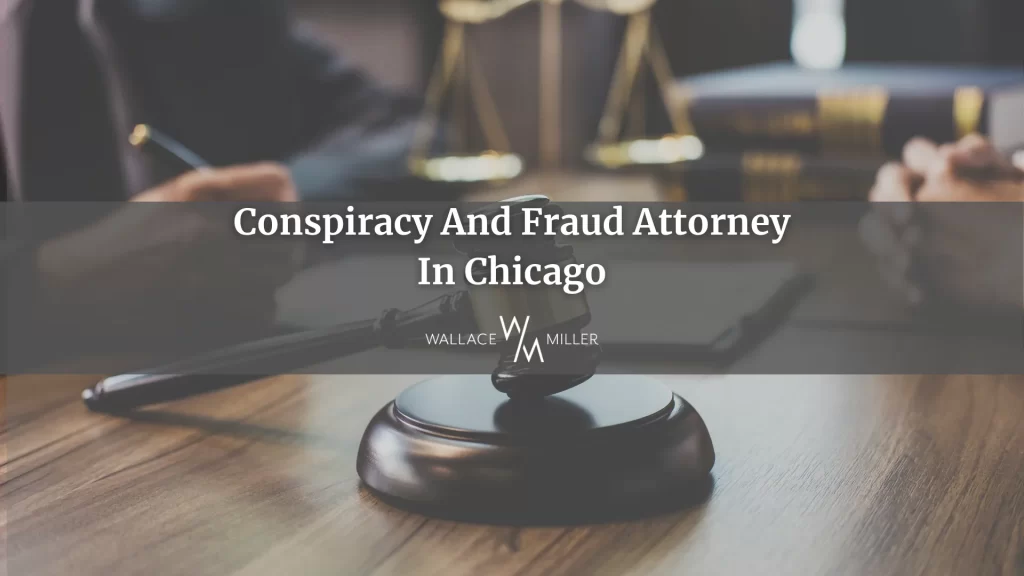
If you are the victim of conspiracy or fraud by an insurance company, mortgage lender, or another party, do not hesitate to contact the class actions and commercial litigation lawyers of Wallace Miller. You might be entitled to compensation for the financial consequences of the illegal or unfair activity. We could help you pursue legal action against the individual or company and seek the justice you deserve.
Fraud and conspiracy can damage a consumer’s economic standing and financial future. Federal and state regulations are supposed to protect consumers from unfair business practices, deceptive marketing, and other illegal acts. You have a right to hold the fraudulent company liable for the harm they cause. Wallace Miller is ready to represent you in your case and try to recover the maximum compensation available to compensate you for your losses.
The conspiracy and fraud attorneys of Wallace Miller understand the struggles you face. When you discover that someone you trusted mistreated you, it can be devastating. Whether a medical provider billed you for services they never provided or a manufacturer failed to disclose the dangers of its product, we will create a strategy to try to hold them accountable for their wrongdoing. You can count on our legal team to be your advocate and provide the legal guidance and support you need.
Call Wallace Miller at (312) 261-6193 for your free consultation and learn more about the available legal options.
Common Types of Conspiracy and Fraud
Any business can engage in acts of fraud or conspiracy. Consumer fraud occurs when a business engages in unfair or illegal conduct that causes harm to a consumer. Conspiracy involves two or more parties agreeing to engage in unlawful acts to accomplish a goal or purpose that can harm a consumer.
As a consumer, you could pursue civil action against the company if their activities contributed to the harm you suffered, such as financial losses or emotional distress. The most common types of consumer conspiracy and fraud include:
- False advertising – Businesses must be truthful in advertisements. Marketing a product as safe when it contains a defect that can cause injury or using a bait and switch tactic qualifies as a false advertising practice.
- Medicare fraud – You could file a claim under the False Claims Act for fraudulent activity that violates federal law. Instances of Medicare fraud can include unbundling billing codes, overcharging for products, and billing for medically unnecessary services.
- Federal Housing Administration (FHA) mortgage fraud – The FHA assists moderate and low-income families and individuals in purchasing homes. The FHA insures loans through private lenders. You could sue the lender if they falsified loan documents, unfairly denied your application, or used other unlawful practices while handling your loan or application.
- Credit card fraud – Anyone could get their hands on someone else’s credit card information and use it without the cardholder’s knowledge or consent. Initiating a scam by pretending to be the credit card company is the most common way of obtaining this information.
- Data breach – A data breach occurs when a government agency, company, or another type of organization collects a customer’s personal information and discloses it to the public without authorization.
- Insurance fraud – Insurance companies must comply with all terms of a policyholder’s claim. Underpaying a claim, charging illegal fees, and otherwise acting in bad faith could entitle you to compensation.
- Identity theft – The Fair Credit Reporting Act defines identity theft as fraudulently using or attempting to use someone else’s identity without authorization. A person or company could gain access to personal information by stealing mail, using employer access to credit reports, or engaging in a scam.
- Misrepresentation or omission of material facts – When a company misrepresents the facts, they either lie or fail to disclose vital information about a product to convince you to purchase it.
- Defective products – Manufacturers knowingly supplying defective products to the public can be liable for the injuries they cause. Defects can involve a poor design, inadequate warning label, or manufacturing error.
- Broker fraud – Brokers have a legal obligation to disclose all investment risks to a client. Lack of diversification, excessive trading, and unsuitable investments based on a client’s risk profile are a few examples of fraudulent activity.
- Breach of contract – When you enter a contract, you expect the other party to uphold their duties and obligations. A breach of contract occurs when a company or person doesn’t comply with specific terms of the contract.
- Unfair terms and conditions – Sometimes, companies mislead consumers and convince them to sign contracts with unfair conditions or hidden terms.
If you are the victim of any type of conspiracy or fraud, reach out to Wallace Miller immediately. We can review the circumstances and determine whether you have a case to pursue. You might even qualify to participate in a class-action lawsuit against the negligent business or individual.
Federal Consumer Protection Laws
The Federal Trade Commission (FTC) enforces a range of laws to protect consumers from deception, fraud, and unfair business practices. These laws include:
- Fair Credit Billing Act – The Fair Credit Billing Act establishes the process for correcting billing errors found on credit cards, such as fraudulent charges.
- Magnuson-Moss Warranty Act – This act regulates manufacturers and sellers. It requires them to explain warranty coverage, exclusions, and terms.
- Identity Theft and Assumption Deterrence Act – The ITADA provides services to consumers to educate them on identity theft and how to file a complaint.
- Fair Credit Reporting Act – The FCRA outlines the procedure for correcting mistakes on a person’s credit report.
- Credit Card Accountability, Responsibility, and Disclosure Act – The CARD Act limits the penalties and fees credit card companies can charge a cardholder. It also limits the amount they are allowed to increase rates and when.
- Truth in Lending Act – The Truth in Lending Act (TILA) protects consumers against unfair and inaccurate credit card practices and credit billing. Lenders must provide information regarding loan costs so borrowers can compare them with other loans.
- Fair Debt Collection Practices Act – The FDCPA prevents debt collectors from collecting overdue bills using deceptive and unfair practices.
It’s vital to understand your rights as a consumer. Knowing these laws and how to navigate the complex legal process can benefit the outcome of any legal action you decide to pursue.
Elements of a Class Action Lawsuit
You could report the conspiracy or fraud and attempt to resolve it with the help of your attorney. You might also qualify for a class-action lawsuit against the fraudulent party. Instead of pursuing legal action individually, you can join a group of people harmed by the same person or company.
A class-action lawsuit combines multiple cases into one lawsuit against the same defendant. One or a few people can be the named plaintiff in the lawsuit and represent the entire class of plaintiffs.
The representative or representatives in the lawsuit must have the same or similar injuries as the members of the class. They must also have suffered some type of harm caused by the same defendant as everyone else involved in the case.
Pursuing a class action lawsuit can simplify the entire legal process. Instead of pursuing legal action alone, you can provide information regarding the circumstances specific to your case in one lawsuit with others.
Compensation for Consumer Fraud and Conspiracy

To prove fraud occurred and to be eligible for compensation for the harm you suffered, you must prove that the three elements exist:
- The individual or company engaged in unlawful conduct;
- The business knew that its actions could harm the consumer; and
- The consumer suffered losses due to the illegal or unlawful activity.
The compensation you receive in an individual lawsuit or class action could compensate you for a variety of losses, such as:
- Reasonable attorneys’ fees
- Court costs and filing fees
- Financial losses resulting from the fraudulent acts
- Applicable interest on financial losses
You might also recover punitive damages. This is a form of compensation that punishes the defendant for their actions. You must provide clear and convincing evidence of the particularly egregious behavior of the defendant for the court to make an award of punitive damages to you.
Contact Us
Wallace Miller believes in representing clients who suffered harm due to a company’s unfair business practices. You should not face the consequences of someone else’s fraudulent acts. The party responsible for your financial losses should compensate you for your incurred expenses.
Our conspiracy and fraud attorneys understand the economic impact of consumer fraud. You might have paid unfair charges on a credit card bill or lost money when a company employee stole your identity. No matter what you’re going through, we know you might not have the resources to afford a lawyer. We take certain cases on contingency, so you’re not responsible for upfront fees or costs. In those cases, we don’t collect our legal fees unless we recover compensation for our clients.
When you hire us, we will immediately investigate the fraudulent incident to determine whether we can hold the at-fault party liable. We have the resources to locate crucial evidence and build a case to bring to court. You can depend on us to fight by your side until the end.
If you experienced financial losses due to conspiracy or fraud committed by another person or a business, call Wallace Miller for your free consultation at (312) 261-6193 now.

